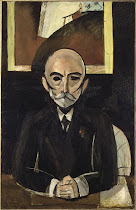Usually, I criticize oversimplifications. For instance: the Nazis were evil. In fact, in historical context the Nazi party was appealing. Hitler did not trick Germany, he was the manifestation of a frustrated nation. Blah, blah, blah. Secretly, I've always appreciated the ignorant condemnation of the Nazi party. It has mass appeal and maybe our stupid outrage would strengthen each generation against fascism and genocide.
Then I read The Reader. It's clear that resolve is weakening.
It's the story of an unlikely intimate relationship between a young man and older woman. Years later he becomes a lawyer and discovers she's on trial as a Nazi war criminal. The book is intelligent, thoughtful but it lacks the crass condemnation of Nazis. In The Reader, we're meant to see the Nazi war criminal as a human being. This requires a careful dance to ensure the reader doesn't drum up instant hate. I was unnerved by this approach. Specifically, I felt the vague term 'prisoners' was often used to avoid 'Jews' sidestepping our emotional reactions to the Holocaust.
Again, we're meant to see the Nazi war criminal as a human being. While I have always argued for this on an intellectual level, I felt safer in a world where we simply chanted Nazis are bad. I guess I believe that most adults should be treated as children.
Literature is an insult to history. It's like turning 9/11 into a rom-com. Historical fiction is a distasteful reduction of facts into recognizable story arcs and emotion. I watched Tarentino's revenge fantasy Inglorious Basterds. I realized that a generation will grow up thinking that the Americans killed Hitler (or at the very least threatened him -we still deny the Soviets their victory).
Inspired by this new 'Holocaust lite' resurgence of WWII in fiction I am going to write a one hour lecture teaching the Nazi party the way I wish I learned about it in high school.
I believe outrage and storytelling miss the point.
Wednesday, October 7, 2009
Subscribe to:
Post Comments (Atom)





1 comment:
Would love to see that lecture.
elisa
Post a Comment